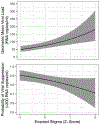HIV stigma and viral load among African-American women receiving treatment for HIV
- PMID: 31259767
- PMCID: PMC6621603
- DOI: 10.1097/QAD.0000000000002212
HIV stigma and viral load among African-American women receiving treatment for HIV
Abstract
Objective: African-American women are more likely than other women in the United States to experience poor HIV-related health; HIV stigma may contribute to these outcomes. This study assessed the relationship between HIV stigma and viral load, over time, among a sample of African-American women receiving treatment for HIV, and explored social support and depressive symptoms as mediators.
Design: Secondary analysis of longitudinal data.
Methods: Data came from a randomized trial of an intervention to reduce HIV stigma among African-American women in HIV care in Chicago, Illinois and Birmingham, Alabama. Sociodemographic and psychosocial data were collected at up to six study visits over 14 months. Viral loads were extracted from medical records during the study period. Generalized linear mixed effects models were used to estimate associations among overall, internalized, and enacted HIV stigma and viral load over time. Mediation analyses were used to estimate indirect effects via social support and depressive symptoms.
Results: Data from 234 women were analyzed. Overall HIV stigma was significantly associated with subsequent viral load (adjusted β = 0.24, P = 0.005). Both between-subject (adjusted β = 0.74, P < 0.001) and within-subject (adjusted β = 0.34, P = 0.005) differences in enacted stigma were associated with viral load. Neither social support nor depressive symptoms were statistically significant mediators.
Conclusion: Ongoing experiences of HIV stigmatization may contribute to increased viral load among African-American women in primary HIV care. Interventions should aim to alleviate the consequences of stigma experienced by patients and prevent future stigmatization.
Conflict of interest statement
Conflicts of Interest: None
Figures
Similar articles
-
HIV-Related Stigma and Viral Suppression Among African-American Women: Exploring the Mediating Roles of Depression and ART Nonadherence.AIDS Behav. 2019 Aug;23(8):2025-2036. doi: 10.1007/s10461-018-2301-4. AIDS Behav. 2019. PMID: 30343422 Free PMC article.
-
Moderating Factors in an Anti-stigma Intervention for African American Women with HIV in the United States: A Secondary Analysis of the UNITY Trial.AIDS Behav. 2019 Sep;23(9):2432-2442. doi: 10.1007/s10461-019-02557-x. AIDS Behav. 2019. PMID: 31218545 Free PMC article.
-
Religiosity, Social Support, and Ethnic Identity: Exploring "Resilience Resources" for African-American Women Experiencing HIV-Related Stigma.J Acquir Immune Defic Syndr. 2019 Jun 1;81(2):175-183. doi: 10.1097/QAI.0000000000002006. J Acquir Immune Defic Syndr. 2019. PMID: 30865171 Free PMC article. Clinical Trial.
-
Social and structural determinants of HIV treatment and care among black women living with HIV infection: a systematic review: 2005-2016.AIDS Care. 2018 Apr;30(4):409-416. doi: 10.1080/09540121.2018.1426827. Epub 2018 Jan 28. AIDS Care. 2018. PMID: 29376409 Free PMC article.
-
Older African Americans and the HIV Care Continuum: A Systematic Review of the Literature, 2003-2018.AIDS Behav. 2019 Apr;23(4):973-983. doi: 10.1007/s10461-018-2354-4. AIDS Behav. 2019. PMID: 30519903 Free PMC article.
Cited by
-
Impact of dedicated women's outreach workers (WOWs) on recruitment of women in ACTG clinical studies.HIV Res Clin Pract. 2021 Apr;22(2):37-45. doi: 10.1080/25787489.2021.1938825. Epub 2021 Jun 18. HIV Res Clin Pract. 2021. PMID: 34143949 Free PMC article.
-
Pills, PrEP, and Pals: Adherence, Stigma, Resilience, Faith and the Need to Connect Among Minority Women With HIV/AIDS in a US HIV Epicenter.Front Public Health. 2021 Jun 21;9:667331. doi: 10.3389/fpubh.2021.667331. eCollection 2021. Front Public Health. 2021. PMID: 34235129 Free PMC article.
-
HIV Stigma is Associated with Two-Year Decline in Cognitive Performance Among People with HIV.AIDS Behav. 2025 Jan;29(1):90-100. doi: 10.1007/s10461-024-04508-7. Epub 2024 Oct 14. AIDS Behav. 2025. PMID: 39397137
-
Exploring the Impact of Experiences with Everyday and Major Discrimination and HIV-Related Stigma on Engagement in HIV Care Among Older African Americans Living with HIV.J Racial Ethn Health Disparities. 2023 Aug;10(4):1910-1917. doi: 10.1007/s40615-022-01373-9. Epub 2022 Jul 25. J Racial Ethn Health Disparities. 2023. PMID: 35876984
-
Exploring relationships between HIV programme outcomes and the societal enabling environment: A structural equation modeling statistical analysis in 138 low- and middle-income countries.PLOS Glob Public Health. 2023 May 9;3(5):e0001864. doi: 10.1371/journal.pgph.0001864. eCollection 2023. PLOS Glob Public Health. 2023. PMID: 37159438 Free PMC article.
References
-
- CDC. Fact sheet: HIV among African Americans. In; 2017.
-
- CDC. Fact sheet: HIV in the United States: The Stages of Care In: Centers for Disease Control and Prevention; 2014. pp. CDC Fact Sheet.
-
- CDC. HIV Surveillance in Women (through 2016). Atlanta: CDC; 2017.
MeSH terms
Substances
Grants and funding
LinkOut - more resources
Full Text Sources
Medical



